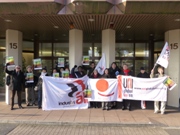UNI Global Union takes demands for justice to Mexican Authorities

Aglobal union delegation including, UNI Global Union, ITUC and IndustriALL met with a senior Mexican diplomatic delegation in Geneva and called for the Mexican government to improve the country’s deplorable record on labour relations. It was part of a global week of action to highlight the country’s poor union rights record and a call for action:
· Provide justice for the 65 Pasta de Conchos miners killed in 2006
· End employer-dominated and corrupt protection contracts that deny workers right to freedom of association and collective bargaining
· Repeal 2012 labour law that encourages dismissal of union activists and subcontracting leading to spread of precarious work
· Reinstatement of unlawfully dismissed union activists
Jennings said, “We bring a stark message to the Mexican government: they must end the bedrock of corruption which reaches across the country. Mexico needs a new legal framework which puts an end to protection contracts and precarious work. The 2012 labour law is a charter for low pay and insecurity paving the way for the race to the bottom.”
In a surprise admission the Mexican delegation concurred that protection contracts were a blight on Mexican labour relations and that they had no place in the pursuit of decent work. The Mexican delegation took pains to point out that the newly elected President Nieto aimed to improve the working lives of struggling Mexican people. The Ambassador offered to build a dialogue with the global unions and announced that a labour attaché would now be permanently based in Geneva who would pursue this aim.
Jennings welcomed this offer but drew attention to the rotten core of labour relations in Mexico. He said, “We are not at all convinced that the new labour law of 2012 will be effective in ending the practice of protection contracts. Mexico needs a new legal framework. A process must begin to make a bonfire of protection contracts. It is not acceptable in a supposed new era of human rights and business that the likes of Walmart, Atento and other global brands base their labour relations in Mexico on protection contracts.”

